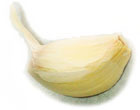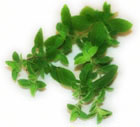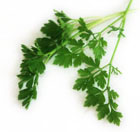Recipe
GOODNESS
 Bay Leaf:
That green headband around Ceasar's head was bay, and it has a long and glorious
culinary history in Mediterranean countries.
Bay Leaf:
That green headband around Ceasar's head was bay, and it has a long and glorious
culinary history in Mediterranean countries.Bay can be bitter when fresh, so let it dry for a few days if you pluck it green from the tree. After drying, it keeps nicely in an airtight jar. It gives up its flavor slowly, which is why you add it to the beginning of slow-cooked soups and stews. It has a slightly musty aroma with shades of nutmeg that can overpower a dish, so only use half a leaf for each serving. Don't forget to pull them out before serving! |
 Carrots:
We all know that carrots are good for your eyes, but did you know they have anti-cancer properties as well? They have the nicely named carotenoids that are antioxidents -- chemicals that mop up the damage that results from ordinary metabolism. That, in turn, helps to keep your cells from turning rogue and hanging with the cancer gangs. If that's not enough to make you grab a carrot, they turn out to be immune-system stimulators as well, meaning you'll have fewer occasions to ask "What's up, doc?" Yes there's a little sugar in them, but also a lot of fiber to buffer it, so only the most sugar-restricted people should worry. By the way, the vitamin K in carrots is easier to absorb if you eat them with a bit of oil or fat, like a dip. Carrots:
We all know that carrots are good for your eyes, but did you know they have anti-cancer properties as well? They have the nicely named carotenoids that are antioxidents -- chemicals that mop up the damage that results from ordinary metabolism. That, in turn, helps to keep your cells from turning rogue and hanging with the cancer gangs. If that's not enough to make you grab a carrot, they turn out to be immune-system stimulators as well, meaning you'll have fewer occasions to ask "What's up, doc?" Yes there's a little sugar in them, but also a lot of fiber to buffer it, so only the most sugar-restricted people should worry. By the way, the vitamin K in carrots is easier to absorb if you eat them with a bit of oil or fat, like a dip. |
 Celery:
Celery isn't just for Bloody Marys, although that's as close as many people get to this healthful veggie. Celery may have been used as a hangover cure in ancient Rome, but its real power lies in its ability to lower blood pressure and to keep your weight under control. If you have either of these problems (and they often travel together) you could do worse than grabbing a stalk of celery to chew on. Celery:
Celery isn't just for Bloody Marys, although that's as close as many people get to this healthful veggie. Celery may have been used as a hangover cure in ancient Rome, but its real power lies in its ability to lower blood pressure and to keep your weight under control. If you have either of these problems (and they often travel together) you could do worse than grabbing a stalk of celery to chew on. |
 Garlic:
Garlic is in the same family as onions and leeks, and purportedly provided ancient Roman soldiers the courage to battle the barbarians.
Whether or not it gives you courage, it is known to lower blood pressure, which is great for your heart and helps prevent stroke.
In addition, it has a long history as a digestive aid, so don't be shy with this wonderful herb, no matter what it does to your breath!
Garlic:
Garlic is in the same family as onions and leeks, and purportedly provided ancient Roman soldiers the courage to battle the barbarians.
Whether or not it gives you courage, it is known to lower blood pressure, which is great for your heart and helps prevent stroke.
In addition, it has a long history as a digestive aid, so don't be shy with this wonderful herb, no matter what it does to your breath! |
 Oregano:
This tasty herb finds itself in much Mediterranean cooking, and is just loaded with nutrients. It is good for the digestion, and has many powerful anti-oxidants (even more than blueberries) and anti-carcinogens. It also has antibacterial and antiparasitic properties. As if that weren't enough, is also an antifungal, even taking on the notorious candida yeast. You want to use fresh oregano, as the dried herb loses the volatile oils that are responsible for its many benefits.
Oregano:
This tasty herb finds itself in much Mediterranean cooking, and is just loaded with nutrients. It is good for the digestion, and has many powerful anti-oxidants (even more than blueberries) and anti-carcinogens. It also has antibacterial and antiparasitic properties. As if that weren't enough, is also an antifungal, even taking on the notorious candida yeast. You want to use fresh oregano, as the dried herb loses the volatile oils that are responsible for its many benefits. |
 Parsley:
This refreshing herb is good for your breath and is apparently refreshing to the rest of your body. Like all green herbs, it is loaded with chlorophyll, which is just good for people. It helps you build tissue and fight inflammation. It has even been shown to help manage blood sugars and helps to keep your weight in check. More studies are needed, but it may even help to fight cancer. All that, and a breath freshener too? Who could ask for more?
Parsley:
This refreshing herb is good for your breath and is apparently refreshing to the rest of your body. Like all green herbs, it is loaded with chlorophyll, which is just good for people. It helps you build tissue and fight inflammation. It has even been shown to help manage blood sugars and helps to keep your weight in check. More studies are needed, but it may even help to fight cancer. All that, and a breath freshener too? Who could ask for more? |
ADVERTISEMENT
Help • Site Map • About Us • Contact Us • Privacy Policy • Press Center
Spice Plan™ Copyright © 2009 by Scott Charles Anderson. All rights reserved.